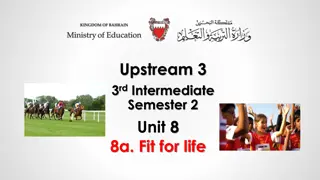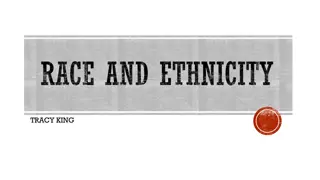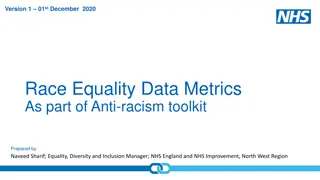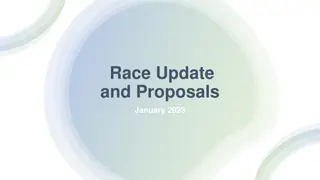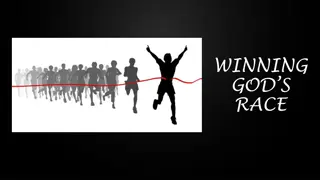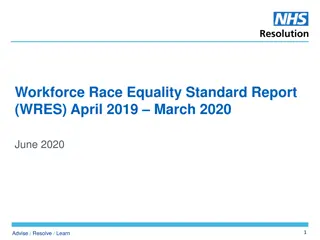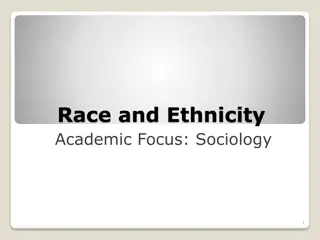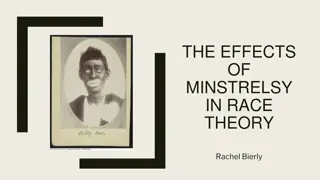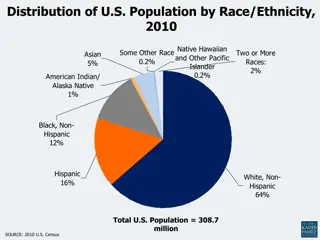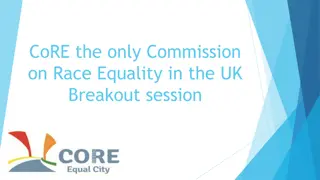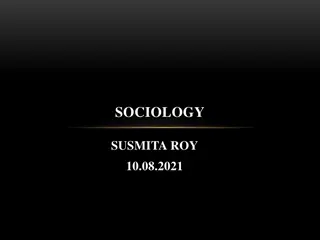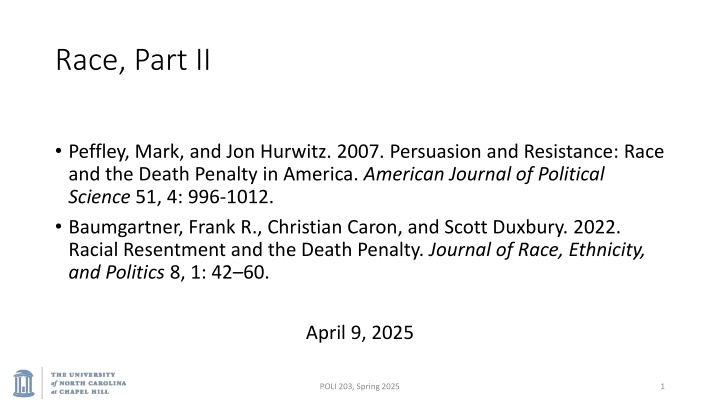
Understanding Racial Dynamics in Death Penalty Support
Explore the impact of race on attitudes towards the death penalty, revealing how perceptions of crime attribution, punitiveness, education, gender, and income influence support across different racial groups in America.
Download Presentation

Please find below an Image/Link to download the presentation.
The content on the website is provided AS IS for your information and personal use only. It may not be sold, licensed, or shared on other websites without obtaining consent from the author. If you encounter any issues during the download, it is possible that the publisher has removed the file from their server.
You are allowed to download the files provided on this website for personal or commercial use, subject to the condition that they are used lawfully. All files are the property of their respective owners.
The content on the website is provided AS IS for your information and personal use only. It may not be sold, licensed, or shared on other websites without obtaining consent from the author.
E N D
Presentation Transcript
Race, Part II Peffley, Mark, and Jon Hurwitz. 2007. Persuasion and Resistance: Race and the Death Penalty in America. American Journal of Political Science 51, 4: 996-1012. Baumgartner, Frank R., Christian Caron, and Scott Duxbury. 2022. Racial Resentment and the Death Penalty. Journal of Race, Ethnicity, and Politics 8, 1: 42 60. April 9, 2025 POLI 203, Spring 2025 1
Peffley and Hurwitz, Persuasion and Resistance: Race and the Death Penalty Good review of the literature on who supports the death penalty. They do a survey experiment, very similar to the previous study. They break the sample into 3 groups (see Table 1, p. 1002) POLI 203, Spring 2025 2
Three conditions Race of Respondent Baseline condition Racial condition Innocence condition Some people say that the death penalty is unfair because most of the people who are executed are African Americans. Some people say the death penalty is unfair because too many innocent people are being executed. Do you favor or oppose the death penalty for persons convicted of murder? Do you favor or oppose the death penalty for persons convicted of murder? Do you favor or oppose the death penalty for persons convicted of murder? White 65% favor 77 % favor 64% favor Black 50% favor 38 % favor 34% favor N 120 211 244 POLI 203, Spring 2025 3
Lets look at that with some care Race of Respondent Baseline condition Racial condition Innocence condition White 65% +12 -1 Black 50% -12 -16 Whites: Racial condition, they go up., Innocence condition they don t move from general support. Blacks: They go down in either case. POLI 203, Spring 2025 4
Their explanation for this, Table 2 In the racial condition, what really drives things, among whites? Black crime attribution the idea that black people commit more crime General crime attribution the idea that crime comes from personal choices, not structural factors Punitiveness general support for harsh punishments Education level Male (huge predictor) Income Profile: Poorly educated, wealthy male, who is punitive, attributes crime to personal choices, and thinks blacks choose this path more than whites do. POLI 203, Spring 2025 5
Note that the other conditions show different predictors and the same model does not work for black respondents Generally, predictors are: Punitiveness, education, gender Some things that don t matter, perhaps surprisingly: ideology and Party ID POLI 203, Spring 2025 6
Dispositional v. systemic causes of crime Let s go back to Peffley and Hurwitz for a minute General attribution of crime (appendix, p. 1009) Do you feel crime is caused more by poverty and lack of opportunity, or by people being too lazy to work for an honest living? Is it due to poverty and lack of opportunity, or because many younger people don t respect authority? POLI 203, Spring 2025 7
Why do people commit crime? They are psychopaths and evil? They are lazy and make bad choices? They are embedded in a structure that provides them no opportunities and so they are forced into bad choices? Maybe some combination of structures and individual choices? POLI 203, Spring 2025 8
Why are some people rich, or poor? They work hard / fail to work hard? They were born into a family that gave them every opportunity / born into a situation that made everything more difficult? They lived in an area with great schools, low crime, etc. / they grew up in an area with no opportunities? They inherited a trust fund / they grew up in poverty? Maybe some combination of individual and systemic causes? POLI 203, Spring 2025 9
Good book on this topic: It s about attributions of life outcomes Rich: Deserving (worked hard) or not (got lucky, born into wealth) Poor: Deserving (lazy, unwilling to do what it takes) or not (structural barriers to success) All about deservingness Same with punishment. POLI 203, Spring 2025 10
Individual v. situational explanations We can all recognize that some successful people are successful because they worked hard. Some poor or unsuccessful people are so because they are lazy or refuse to work hard. At the same time, we can all recognize that there are situational factors as well: good schools, good opportunities, an uncle who can offer a summer job, etc. People can recognize both factors, but tend in one direction or another. POLI 203, Spring 2025 11
Liberal / conservative v. individual / situational Conservative ideology emphasizes individual choice and responsibility, matching the American dream of self-made men and self-reliance. Progressive ideology is more likely to focus on structural barriers to success for some and structural advantages for others. Neither is completely true, of course. But people can emphasize one over the other. Compared to other countries, Americans accept the individual explanation much more than others. Self-made men are the quintessential American success story. This actually has more implications than you may have realized, since it implies that the failed person failed by lack of effort. POLI 203, Spring 2025 12
Crime and other outcomes People s attribution of crime, poverty, or success to either the individual s own poor (good) choices v. to structural or systemic causes determines their idea of the proper response to it. Individualistic causes of crime: Harsher punishment Individualistic causes of wealth: low taxes, no redistribution to the poor, since the poor are poor because of their own choices. Systemic causes of crime, or poverty: It s hard to support harsh punishments, if the person did not choose that path in life, but had it given to them. This is a good way to understand people s ideology: Just ask them a few questions about why are the rich rich and the poor poor. POLI 203, Spring 2025 13
Race and deservingness Peffley and Hurwitz are basically exploring the degree to which whites attribute a deservingness to blacks when considering crime. Why would we connect race (or othering) with deservingness? People like me work hard and deserve what we get. People like them are lazy. Or, from the other side: People like me have unfair barriers. People like them get things handed to them at birth. POLI 203, Spring 2025 14
Racial resentment and the death penalty Article is on co-authored with PhD student Christian Caron and Sociology professor Scott Duxbury We take the 50 states and count how many death sentences are imposed each year, in each state. How can we predict / understand the relative use of the death penalty across the states? POLI 203, Spring 2025 15
The Racial Resentment Scale Do you agree strongly, agree somewhat, neither agree nor disagree, disagree somewhat, or disagree strongly with each of the following statements? (1) Irish, Italians, Jewish and many other minorities overcame prejudice and worked their way up. Blacks should do the same without any special favors. (2) Generations of slavery and discrimination have created conditions that make it difficult for blacks to work their way out of the lower class. (3) Over the past few years, blacks have gotten less than they deserve. (4) It s really a matter of some people not trying hard enough; if blacks would only try harder they could be just as well off as whites. POLI 203, Spring 2025 16
Lynchings, poverty, black pop share drive resentment. Resentment and other factors drive death sentencing. Voila! POLI 203, Spring 2025 17
Our predictive model includes these variables Population size Homicides in the previous year Violent crime rate in the previous year Percent black in the population The history of lynchings in the state (number) Republican governor (yes / no) Republican share of the state legislature (percent) Whether they elect or appoint judges in the state Whether the state is in the south How many death sentences have been previously imposed, from 1976 to the current year (e.g., momentum) Year POLI 203, Spring 2025 18
But our model also includes these: Racial Resentment Measured by cumulative response to 4 questions previously discussed Then aggregated by year and by state. So we get an aggregate measure of racial resentment for the entire state. Lowest resentment, VT, OR, MA, RI, WA, all from the early 1990s Highest resentment, AR, WV, TN, SD, IN, ND, LA, all from later years (Resentment is generally growing over time, and it differs from state to state.) Conservative v. liberal ideology score Separately measured based on a similar method, taking huge numbers of surveys and estimating the average score on a left-right scale, for each state, year by year. (Someone else did this.) POLI 203, Spring 2025 19
What do the results show? Year: Decline over time Momentum: big effect for previous usage Elected Judges impose more No effect for partisanship of legislature or governor Violent crime, but not homicides, controlling for population size Conservative ideology: Yes Racial resentment: Yes POLI 203, Spring 2025 20
Also, an indirect effect for race and lynchings No direct effect. However, states with a history of lynchings tend to have more black population still today. These states have higher levels of racial resentment, and more conservative political ideology. We can show that that history of lynchings operates still today by exacerbating racial resentment and ideology. POLI 203, Spring 2025 21
Main effect Controlling for all those variables, including general ideological conservativism, states with higher levels of racial resentment have higher levels of use of the death penalty. Others have shown that responses to that set of questions strongly affect death penalty attitude at the individual level. (see the paper for the citations) We show that this actually affects the number of sentences imposed Pretty ugly stuff. But good to know if you want to understand the death penalty POLI 203, Spring 2025 22

![❤[PDF]⚡ Escaping from Eden: Does Genesis Teach that the Human Race was Created](/thumb/21697/pdf-escaping-from-eden-does-genesis-teach-that-the-human-race-was-created.jpg)
